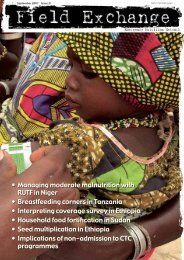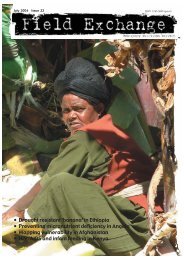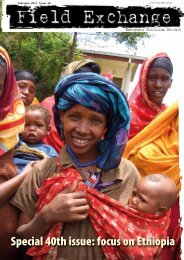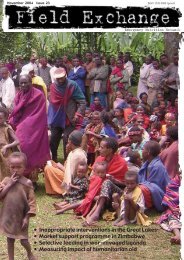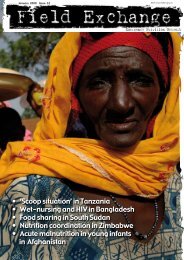Download a PDF of this issue - Field Exchange - Emergency ...
Download a PDF of this issue - Field Exchange - Emergency ...
Download a PDF of this issue - Field Exchange - Emergency ...
You also want an ePaper? Increase the reach of your titles
YUMPU automatically turns print PDFs into web optimized ePapers that Google loves.
News<br />
CMAM Forum Update<br />
Community-based management <strong>of</strong> acute malnutrition<br />
1 (CMAM) has been adopted by over 60<br />
countries 2 (as <strong>of</strong> December 2011), to help combat<br />
acute malnutrition in children under five years and<br />
reduce childhood mortality. The expansion <strong>of</strong> the CMAM<br />
approach into a variety <strong>of</strong> contexts, and the escalating<br />
demand to consolidate and share CMAM data and experiences,<br />
has created the need for a clear, accessible<br />
mechanism to facilitate information sharing. Many<br />
governments and other stakeholders share similar challenges<br />
regarding the quality <strong>of</strong> CMAM implementation<br />
and scale-up <strong>of</strong> services but are not always successful in<br />
capitalising on lessons learned within and among countries<br />
or agencies, making it difficult to move forward to<br />
achieve greater impact in a coordinated and effective<br />
manner. There has been a ‘patchwork’ <strong>of</strong> initiatives relating<br />
to information-sharing on the management <strong>of</strong> acute<br />
malnutrition, with no overall ‘umbrella’ initiative to bring<br />
these groups together and facilitate progress in a coherent<br />
manner.<br />
In response to <strong>this</strong> need, a group <strong>of</strong> experts have<br />
collaborated in the creation <strong>of</strong> a CMAM Forum over the<br />
past year. The CMAM Forum aims to improve health<br />
outcomes <strong>of</strong> vulnerable populations through the provision<br />
<strong>of</strong> a robust information-sharing mechanism which<br />
expands the knowledge-base <strong>of</strong> management <strong>of</strong> acute<br />
malnutrition to help support implementation and monitoring<br />
<strong>of</strong> CMAM activities. CMAM Forum users are<br />
anticipated to be from a range <strong>of</strong> health and nutrition<br />
sectors with strong national representation. The Forum<br />
aims to be especially practical for those implementing<br />
programmes.<br />
The CMAM Forum development has a phased<br />
approach where in Phase One, the working modalities<br />
were explored and foundations built and during Phase<br />
Two, the CMAM Forum activities are being rolled out<br />
(pending funding). Phase One started in September<br />
2011 with funding from UNICEF and Action Contre la<br />
Faim France (ACF-F). Two co-facilitators, seconded from<br />
ACF-F and Valid International, were appointed to lead<br />
the activities. A steering committee has been established<br />
with technical experts 3 to help guide activities.<br />
A website has been developed and just launched at<br />
www.cmamforum.org. In addition to general resources,<br />
the website includes sections on training, advocacy and<br />
research and monthly ‘Technical Briefs’ to summarise<br />
current topics pertinent to CMAM. Wherever possible,<br />
the Forum will create linkages and improve access to<br />
relevant initiatives and resources, rather than duplicate<br />
them.<br />
If you would like further information or to share any<br />
resources relevant to the management <strong>of</strong> acute malnutrition,<br />
please contact: cmamforum@gmail.com<br />
1<br />
Community-Based Management <strong>of</strong> Acute Malnutrition (CMAM)<br />
includes community outreach for community involvement and<br />
early detection and referral <strong>of</strong> cases <strong>of</strong> acute malnutrition,<br />
and follow up <strong>of</strong> problem cases in their homes, management<br />
<strong>of</strong> severe acute malnutrition (SAM) in outpatient care for children<br />
6-59 months with SAM without medical complications,<br />
the management <strong>of</strong> SAM in inpatient care for children 6-59<br />
months with SAM and medical complications and children<br />
under 6 months with acute malnutrition, and the management<br />
<strong>of</strong> moderate acute malnutrition (MAM) for children 6-59 months.<br />
CMAM is also known as Integrated Management <strong>of</strong> Acute<br />
Malnutrition (IMAM) or Community-based Therapeutic Care (CTC).<br />
2<br />
UNICEF Global SAM Treatment Update-2011, May 2012<br />
Steering Committee members are from ACF-F, Concern<br />
Worldwide, <strong>Emergency</strong> Nutrition Network (ENN), Food and<br />
Agriculture Organisation (FAO), Food and Nutrition Technical<br />
Assistance II and III Projects (FANTA), IASC GNC, International<br />
Centre for Diarrhoeal Disease Research, Bangladesh (ICDDR,B),<br />
International Malnutrition Task Force (IMTF), Ministry <strong>of</strong> Health<br />
country representatives, Save the Children UK, UNICEF, United<br />
Nations Systems Standing Committee on Nutrition (UNSCN),<br />
Valid International, World Food Programme (WFP), World<br />
Health Organization (WHO).<br />
FANTA-2 reviews <strong>of</strong> national<br />
experiences <strong>of</strong> CMAM<br />
In 2010 and 2011, FANTA-2 conducted a<br />
series <strong>of</strong> reviews <strong>of</strong> community based<br />
management <strong>of</strong> acute malnutrition in<br />
Mauritania, Burkino Faso, Mali, Niger,<br />
Sudan and Ghana. The reviews involved<br />
document review and field trips. Areas <strong>of</strong><br />
focus for Mauritania, Burkino Faso, Mali<br />
and Niger included CMAM integration into<br />
the health system and into other relevant<br />
health and nutrition initiatives, CMAM<br />
scale up plans and activities (national and<br />
sub-national), capacity development, and<br />
successes and lessons learned to inform<br />
strategy development and programming.<br />
In Sudan, community outreach experiences<br />
and strategy development for CMAM<br />
was the particular focus.<br />
In Ghana, on the request <strong>of</strong> the SAM<br />
Severe Acute Malnutrition Support Unit<br />
(SAM SU) <strong>of</strong> the Ghana Health Service<br />
(GHS), FANTA conducted a review <strong>of</strong><br />
CMAM activities at district and learning site<br />
level including plans for scaling up. The<br />
objectives <strong>of</strong> the review were to assess the<br />
A standard for standards in<br />
humanitarian response<br />
Anew web portal has been launched<br />
recently to highlight key standards<br />
and guidance, and encourage those<br />
engaged in humanitarian response to incorporate<br />
them into their work.<br />
Humanitarian Accountability Partnership<br />
(HAP) International, People In Aid and the<br />
Sphere Project supported by the Active<br />
Learning Network for Accountability and<br />
Performance (ALNAP) have developed <strong>this</strong><br />
initiative to bring greater coherence<br />
amongst standards and so increase the<br />
chance <strong>of</strong> them being put into practice.<br />
integration <strong>of</strong> CMAM services into the<br />
learning sites, assess learning sites’ performance,<br />
review recent plans and initiatives to<br />
scale up CMAM in Ghana, and provide<br />
recommendations for strengthening those<br />
plans.<br />
As well as individual reports for each<br />
review, a summary report <strong>of</strong> review findings<br />
in the four West African countries (Burkina<br />
Faso, Mali, Mauritania, and Niger) is available.<br />
The report discusses the key<br />
determinants for achieving maximum<br />
impact <strong>of</strong> CMAM integration, scale-up, and<br />
quality improvement. The determinants are<br />
grouped in five domains: the enabling environment<br />
for CMAM, competencies for<br />
CMAM, access to CMAM services, access to<br />
CMAM supplies, and quality <strong>of</strong> CMAM.<br />
Optimal practices, a summary <strong>of</strong> findings,<br />
constraints, and practical recommendations<br />
are provided for each key determinant.<br />
All reports are available to download at:<br />
http://www.fantaproject.org<br />
A workshop was held in May 2012 led by<br />
leaders <strong>of</strong> the Joint Standards Initiative (JSI)<br />
– HAP International, People in Aid and the<br />
Sphere Project. The JSI is working to create<br />
a coherent set <strong>of</strong> standards that can be used<br />
for small and large aid organizations<br />
involved in humanitarian response and<br />
development. The general consensus was<br />
that there is a need to consult field workers<br />
and local programme managers to determine<br />
the implementation <strong>of</strong> standards.<br />
For more information, visit:<br />
http://www.jointstandards.org/<br />
What do you think <strong>of</strong> <strong>Field</strong> <strong>Exchange</strong>?<br />
The ENN is undertaking an evaluation <strong>of</strong> <strong>Field</strong> <strong>Exchange</strong> between June and August 2012 amongst<br />
those <strong>of</strong> you who receive it in print and access online copy. Through <strong>this</strong> evaluation, we wish to:<br />
• Gain an insight into your use <strong>of</strong> <strong>Field</strong> <strong>Exchange</strong><br />
• Learn about your preference for print and online access to <strong>Field</strong> <strong>Exchange</strong><br />
• Hear what you think about the ENNs role and activities<br />
We invite you all to complete the online questionnaire now available at:<br />
http://www.surveymonkey.com/s/fexevaluation. It should take about 20 minutes to complete and<br />
we would really appreciate that you take the time to complete it – the findings <strong>of</strong> <strong>this</strong> evaluation will<br />
be used to inform the development <strong>of</strong> <strong>Field</strong> <strong>Exchange</strong>.<br />
The questionnaire may also be downloaded from our website and submitted by email:<br />
thom@ennonline.net<br />
Some <strong>of</strong> you will be contacted by one <strong>of</strong> our researchers for more detailed feedback over the phone<br />
Thanks in advance for taking the time to talk to Illyahna, Bibi or Tara.<br />
If you have any trouble accessing the survey online and would like to feedback by phone, text us your<br />
name and number to: +44 7737 996822 or skype: thom.banks.enn<br />
65



